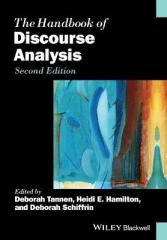"The volume is intended as, and succeeds in being, both an authoritative guide to the field and a contribution to current research" <i>Forum for Modern Language Studies, Vol 39, 2003</i><br /> <p>"(T)he handbook with be a valuable source of information and inspiration for further research in discourse analysis in the context of modern language studies and in linguistics in general." <i>The Modern Language Journal</i><br /> </p> <p>"These are success stories that are bound to encourage researchers from various disciplinary backgrounds and national traditions to turn to discourse analysis as a viable methodological and theoretical framework." <i>Social Anthropology</i></p>
The Handbook of Discourse Analysis makes significant contributions to current research and serves as a comprehensive and authoritative guide to the central issues in contemporary discourse analysis.
- Features comprehensive coverage of contemporary discourse analysis.
- Offers an overview of how different disciplines approach the analysis of discourse.
- Provides analysis of a wide range of data, including political speeches, everyday conversation, and literary texts.
- Includes a varied range of theoretical models, such as relevance theory and systemic-functional linguistics; and methodology, including interpretive, statistical, and formal methodsFeatures comprehensive coverage of contemporary discourse analysis.
Introduction: Deborah Schiffrin (Georgetown University), Deborah Tannen (Georgetown University) and Heidi Hamilton (Georgetown University).
Part I: Discourse Analysis and Linguistics:.
1. Intonation and Discourse: Current Views from Within: Elizabeth Couper-Kuhlen (University of Konstanz).
2. Cohesion and Texture: Jim Martin (University of Sydney).
3. Discourse Markers: Language, Meaning and Context: Deborah Schiffrin (Georgetown University).
4. Discourse and Semantics: Neal Norrick (Saarland University).
5. Discourse and Relevance Theory: Diane Blakemore (Southampton University).
6. Discourse and Information Structure: Gregory Ward and Betty Birner (Northwestern University).
7. Historical Discourse Analysis: Laurel Brinton (University of British Columbia).
8. Typology and Discourse: John Myhill (University of Haifa).
9. Register Variation: A Corpus Approach: Douglas Biber (Northern Arizona University) and Susan Conrad.
Part II: The Linking of Theory and Practice in Discourse Analysis:.
10. Nine Ways of Looking at Apologies: The Necessity of Interdisciplinary Theory and Method in Discourse Analysis: Robin Lakoff (University of California, Berkeley).
11. Interactional Sociolinguistics: A Personal Perspective: John Gumperz (University of California, Berkeley).
12. Discourse as an Interactional Achievement III: The Omnirelevance of Action: Emanuel Schegloff (University of California, Los Angeles).
13. Discourse and Interaction: Monica Heller (University of Toronto).
14. The Linguistic Structure of Discourse: Livia Polanyi (FX Palo Alto Lab).
15. The Variationist Approach Towards Discourse Structural Effects and Socio-Interactional Dynamics: Sylvie DuBois (Louisiana State University) and David Sankoff (Université de Montréal).
16. Computer-Assisted Text and Corpus Analysis: Lexical Cohesion and Communicative Competence: Michael Stubbs (University of Trier).
17. The Transcription of Discourse: Jane Edwards (University of California, Berkeley).
Part III: Discourse: Language, Context, and Interaction:.
Political, Social, and Institutional Domains:.
18. Critical Discourse Analysis: Teun van Dijk (University of Amsterdam).
19. Discourse and Racism: Ruth Wodak (Universität Wein) and Martin Reisigl.
20. Political Discourse: John Wilson (University of Ulster).
21. Discourse and the Media: Colleen Cotter (Georgetown University).
22. Discourse Analysis in the Legal Context: Roger Shuy (Georgetown University).
23. The Discourse of Medical Encounters: Nancy Ainsworth-Vaughn (Michigan State University).
24. Language and Medicine: Suzanne Fleischman (University of California, Berkeley).
25. Discourse in Educational Settings: Carolyn Adger (Temple University).
26. Institutional Narratives: Charlotte Linde (Institute for Research on Learning).
Culture, Community, and Genre:.
27. Discourse and Intercultural Communication: Ronald and Suzanne Scollon (Georgetown University).
28. Discourse and Gender: Shari Kendall and Deborah Tannen (Georgetown University).
29. Discourse and Aging: Heidi Hamilton (Georgetown University).
30. Child discourse: Jenny Cook-Gumperz (University of California, Santa Barbara) and Amy Kryatzis (University of California, Santa Barbara).
31. Computer-Mediated Discourse: Susan Herring (University of Texas).
32. Discourse and Narrative: Barbara Johnstone (Carnegie Mellon University).
33. Discourse and Conflict: Christina Kakavá (Mary Washington College).
Part IV: Discourse Across Disciplines:.
34. The Analysis of Discourse Flow: Wallace Chafe (University of California, Santa Barbara).
35. The Discursive Turn in Social Psychology: Rom Harré (Linacre College, Oxford and Georgetown University).
36. Discourse and Language Teaching: Elite Olshtain (Hebrew University) and Marianne Celce-Murcia (University of California, Los Angeles).
37. Discourse Analysis in Communication: Karen Tracy (University of Colorado).
38. Discourse and Sociology: Sociology and Discourse: Allen Grimshaw (Indiana University).
39. Imagination in Discourse: Herb Clark and Mija VanDerWege (both Stanford University).
40. Literary Pragmatics: Jacob Mey (Odense University).
41. Computational Perspectives on Discourse and Dialogue: Bonnie Webber (University of Pennsylvania).
Index.
The volume begins with an overview of discourse analysis, then moves through an examination of theoretical and methodological issues in the field. The book also presents a wide range of empirical studies of discourse as social and linguistic practice. Since many of the articles are interdisciplinary, the book concludes with an exploration of how different disciplines have become interested in discourse.
The Handbook of Discourse Analysis makes significant contributions to current research and serves as a comprehensive and authoritative guide to the central issues in contemporary discourse analysis.
Produktdetaljer
Biografisk notat
Deborah Schiffrin is Professor of Linguistics at Georgetown University. Major publications include Discourse Markers (1987), Approaches to Discourse (Blackwell 1994), and Language, Text and Interaction (forthcoming).
Deborah Tannen is University Professor and Professor of Linguistics in the Department of Linguistics at Georgetown University. Her books include Gender & Discourse (1994), Talking Voices (1989), Conversational Style (1984), The Argument Culture (1999) and You Just Don't Understand (1990). Her newest book is I Only Say This Because I Love You (2001).
Heidi Hamilton is Associate Professor of Linguistics at Georgetown University.She is author of Conversations with an Alzheimer's Patient (1994), and Discourse Analysis Across Disciplines (forthcoming), and editor of Language and Communication in Old Age (1999).



